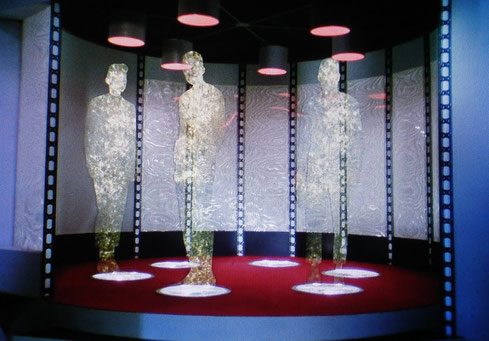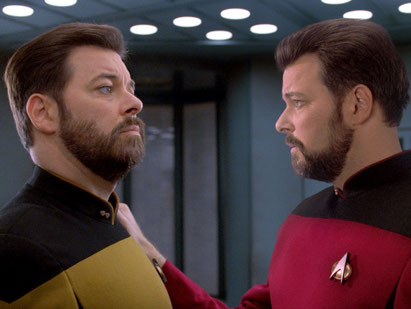
You're Not Really Going to Step onto That Transporter Platform, Are Ya?
I've been having this discussion...well, kind of an argument, with a colleague at work. His name is Geoff. He's
big into sci-fi, like me, and we've talked a lot about time travel theories like the grandfather paradox,
time travel technology, black holes, movies, books, etc.
The argument we're having is about the transporter technology on Star Trek. Have you ever thought about how the transporters work? I mean, really work? It seems simple enough: The computer scans you, breaks you down, then sends your information through a data stream so you can be rebuilt at a new location...
But that's a problem, isn't it? Because that won't be you arriving at your destination. That will be a copy of you, whose going to go on living your life. You died back on the transporter pad because the transporter only copies and transports your information. I feel this is one of those 'nudge-nudge wink wink' situations where everyone who works on the show knows this is a problem, but doesn't discuss it, because then the series could not exist without it.

Actually, even the characters on the various Star Trek series seem to know it too, as there's been some discussion around this topic in the actual story-lines. In the original series, Dr. Leonard H. McCoy (or "Bones" to his friends) made it no secret that he didn't want his atoms scrambled. Lieutenant Reginald Barclay from Star Trek: The Next Generation had an actual transporter phobia. But in both cases the characters' concerns were dismissed as trivial, even ridiculous (personally I don't think they suffered from a transporter phobia as much as they suffered from just plain common sense). The fact that we don't actually know (yet) how consciousness works...let alone how it can be transported, never comes up.
These characters, as well as the viewing audience, are told on the show time and again that transporting technology is extremely 'safe'. I
guess we're forgetting about the time that the transporter split Captain Kirk into two, one who was an 'evil twin'. Or when Commander William Riker was also split in two, leaving his copy
stranded on a planet all by himself for eight years because nobody knew he existed. Or that Outer Limits episode in which a transporter operation fails during the process of
transporting a woman from a space station to a distant planet, and the Operator running the console can't tell if she made it to her destination. So they wait. When it's discovered
that her copy did in fact, arrive, he has to (regrettably) hunt down and kill the original. Yes, it weighed on him very much but hey, you can't have two of ya running around, can
ya? Yikes! (if anyone can remember the name of that episode, please weigh in).
In short? The transporter sounds like a great plot device, but I wouldn't say it sounds like a safe way to travel.
My colleague Geoff says that he would step into the transporter in a heartbeat in order to be able to explore...well, new worlds, I guess.
When I explain he wouldn't really be doing that, that he would in fact be killing himself - he tells me he understands that (?). In fact, he 100% agrees with my assessment on how the
transporter works - but tells me that my thinking is old fashioned (?!). I'm still shaking my head and want to insert more question marks and exclamation points in
brackets.
Anyway, how does this relate to time travel? Well, whether it's Star Trek, Stargate, Terminator, TimeCop or even say Hot
Tub Time Machine (any story that requires the time traveler to step into an actual device), there's a common element. The time traveler has to be broken down and
rebuilt somewhere else - after a transfer of information. Michael Crichton's Timeline dealt head on with this problem by having one of the characters admit that with the time travel
process, the heroes of the novel (who leave present day) are not the same people when they arrive in 1357 France, because they have been "destroyed, and reconstructed". According to the
novel (the review of which you can read here), the process doesn't hurt
apparently.
Check out this amusing (and amazing) video below on the transporter technology in Star Trek.
What do you think? Am I right? Is it you arriving at the other end, or not?
Either way, I'm never stepping in there.
The Trouble with Transporters, with permission of CPG Grey.
Write a comment
Matt Stasyna (Thursday, 17 November 2016 08:00)
Every person will approach this issue differently and fall somewhere on the scale between "Absolutely not" and "No problem!". It certainly is off-putting and terrifying to know I'll be dying to make this machine work, but frankly, I would contest I put my mortality in grave danger every day I choose to commute on the TTC. I'm also viewing it from the vantage point of a human in 2016. The most cutting edge technology available to me as a middle-class citizen is maybe a 3D Printer or a Tesla Minivan. <Yawn>
If I was a Federation citizen, the sheer volume of astonishing things happening on a daily basis (new planets, cultures, wars, mind-blowing cutting-edge discoveries) would probably numb me to the point where a casual temporary death is not even Page 4 news for my day. I'd imagine the sheer magnitude of that universe (and all the mind-blowing events that are occurring around you) would probably make your average citizen pretty lenient in terms of what machines they allow to interact with their body.
The most fascinating thing to me after reading this post is that no matter the technology or iteration of the future we depict, the core issues surrounding culture (namely war, greed, lust) are all rampant as ever. They are simply coated in shinier machines or fancier gear. Most of the Star Trek episodes I recall are the team using advanced technology to travel somewhere and put out some kind of social fire started by a being or beings carrying these same age-old moral handicaps. I'd rather see technology battle inwards and attempt to untangle humanity's disjointed moral web. How do you "take away the bad" (e.g violence) from someone without "losing the good" (inspired artwork that comes from painful experience etc).
I'd like to find a model of teleporter that does that.
Joe (Toronto) (Friday, 18 November 2016 12:47)
What I like about this most are the questions it raises about existence as we know it. What happens to us or the "information" we perceive to be us isn't something science can measure to begin with. Sure, we have technology that tells us if we're living or dead, but the transporter presents a profound and un-answerable question: if I was dead, would would I know? If my information survives, my perceptions live on, my vital signs presumably go on functioning, and I arrive in a new place that I've never been before. It could just as easily be my afterlife as it could be another galaxy and I would have no idea at all. From my perspective I am still alive because I have continued to function. So, would I take the trip of trips through a transporter given the risks? Not a chance. But not because it might be a copy of me coming back. I wouldn't do it because if we were meant to know all the things we don't know that are going on in other places we'd be omni-present. It would sure beat lining up at the airport though! Speaking of which, if transporter travel ever DID become possible would we have a security check at customs? Because I wouldn't want some *doofus* beaming through time and space as me.
Nicolas Kadima (Monday, 05 December 2016 12:30)
I must say I'm kinda with Joe on this one. Not wanting to get too metaphysical, I think that if there is continuity of consciousness and the sense of self, then you come out of the transporter the same person.
Our brain already changes over time and is not the same as when we were born. We think differently as we age. Gosh, we even think differently when drunk! Most of our body’s cells are replaced over our lifetime. Yet there is enough continuity to see one person from birth to death.
What if a person is “transported” while sleeping and never knows he/she has been pulverized then reassembled? Is that person now a new person? Or the same person?
We rely on internal but also external cues to know who we are every day. If most of those are undisturbed, we probably are still the same. I think.
Luc Tremblay (Tuesday, 06 December 2016 14:14)
Considering the high rate of cell death and regeneration, we are hardly the same person from one moment to another...
To start, we replace about 10% of our skeleton every year. Also, despite the small changes in the number of brain cells during adulthood (about 100 billion), each of them can have as many as 10,000 connections, which can take less than a second to be created. As a result, your brain undergoes significant changes every day.
So, are we the same person between the moment we go to bed vs. when we wake up? Is that change of person more or less different than before and after being "transported"?